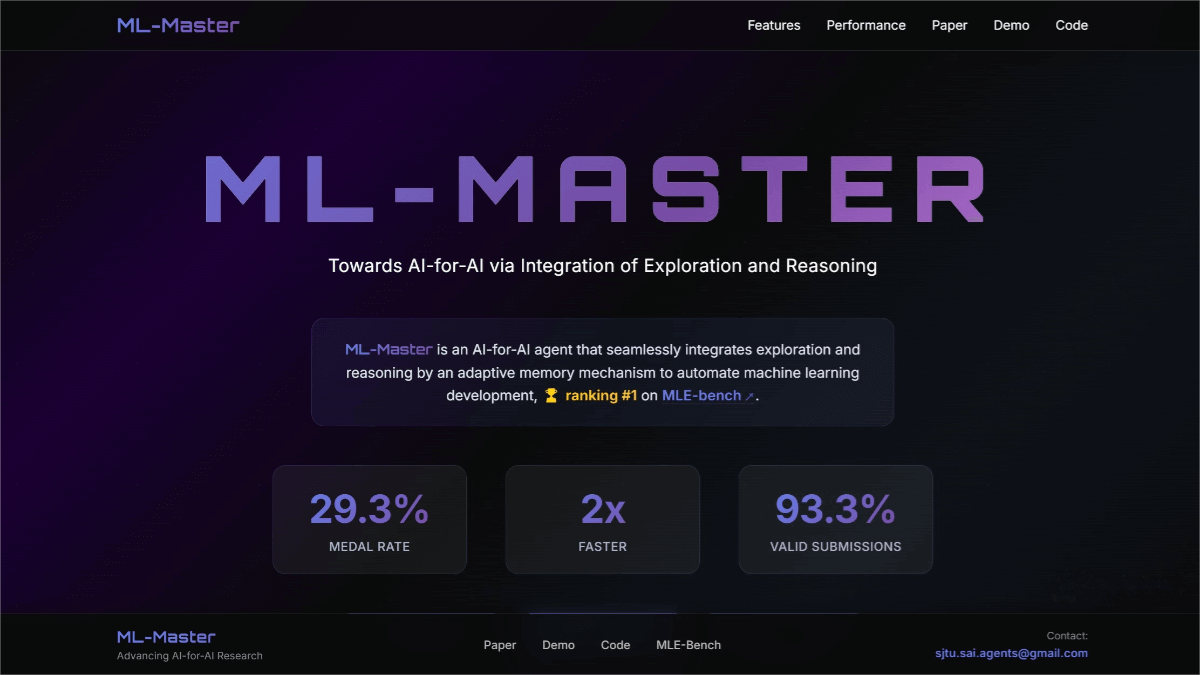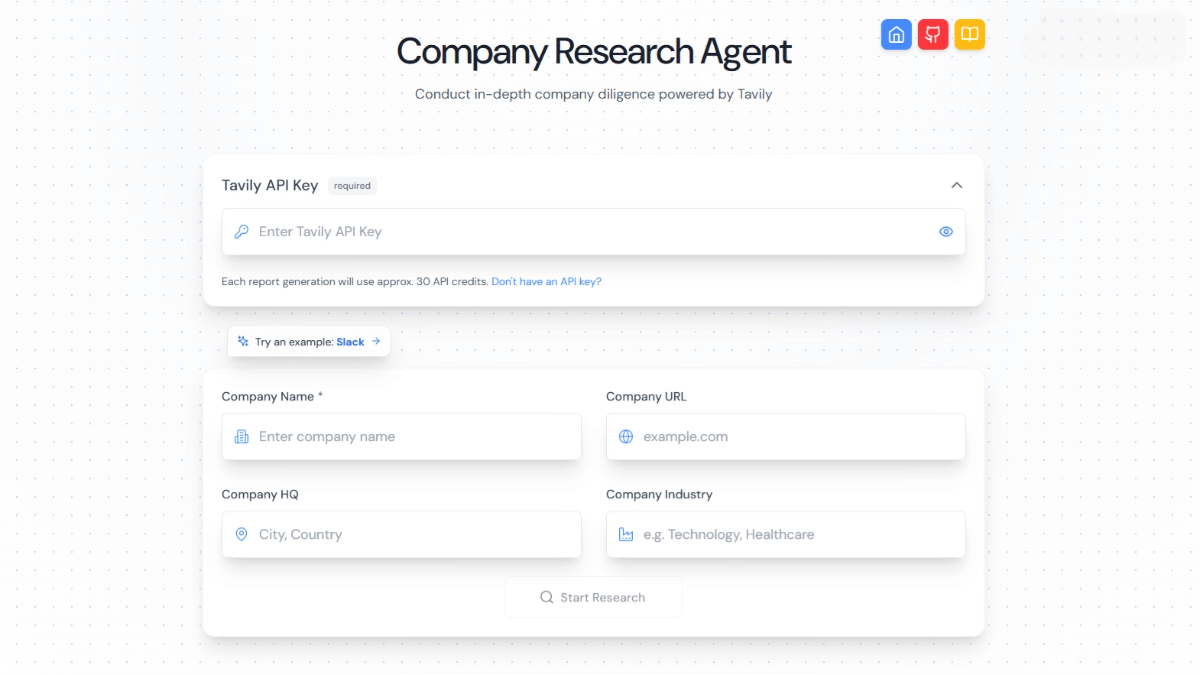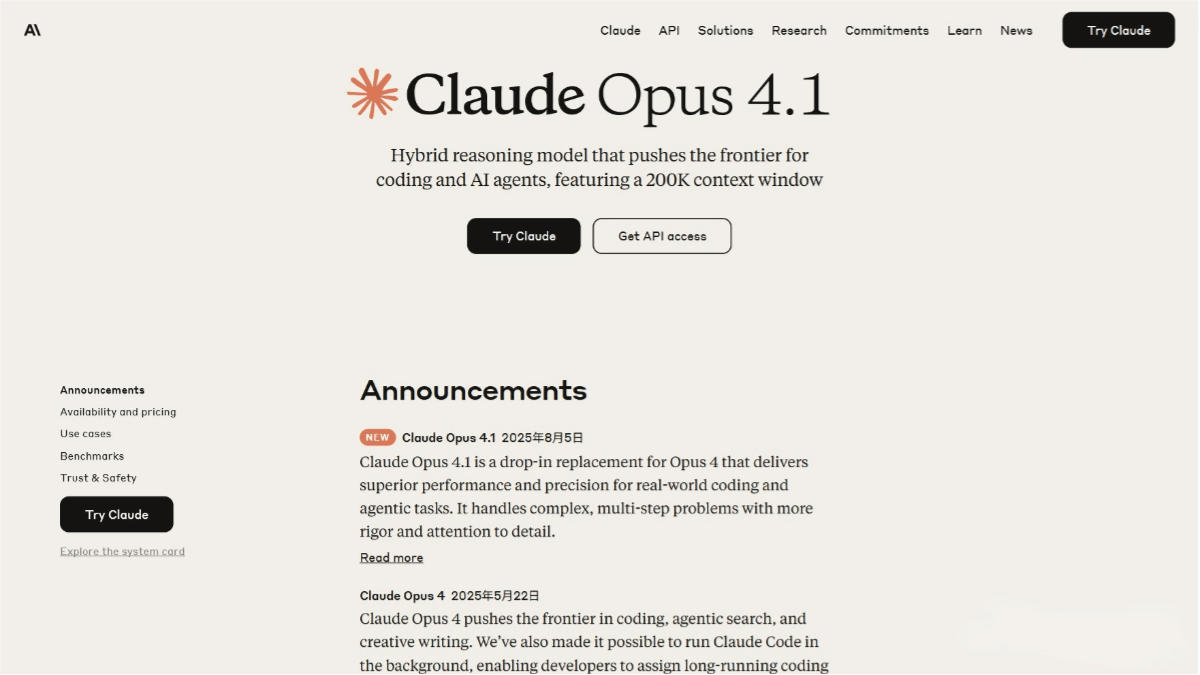ML-Master – An AI Expert Agent Developed by Shanghai Jiao Tong University
What is ML-Master?
ML-Master is an AI expert agent developed by the Agents team at the School of Artificial Intelligence, Shanghai Jiao Tong University. It excels in machine learning tasks by simulating the cognitive strategies of human experts through an innovative “exploration–reasoning deep integration” paradigm. In OpenAI’s authoritative benchmark MLE-bench, ML-Master ranked first with an average medal rate of 29.3%, outperforming competitors such as Microsoft’s RD-Agent and OpenAI’s AIDE. It achieves superior performance in both diagnostic accuracy and computational efficiency by coordinating broad exploration and controlled reasoning through an adaptive memory mechanism.

Key Features of ML-Master
-
Deep Integration of Exploration and Reasoning:
ML-Master simulates expert cognitive strategies by combining wide-ranging exploration with in-depth reasoning, significantly boosting AI performance in complex machine learning tasks. -
Outstanding Benchmark Performance:
-
Achieved 29.3% average medal rate in MLE-bench, outperforming Microsoft’s RD-Agent (22.4%) and OpenAI’s AIDE (16.9%).
-
93.3% of task submissions yielded valid solutions, and 44.9% of tasks outperformed more than half of human participants.
-
Demonstrated strong generalization and stability, completing all benchmark tests in just 12 hours, with half the computational cost of baseline methods.
-
-
Robust Self-Evolution:
ML-Master continually improves its solution quality over multiple task iterations, with final performance exceeding the initial version by over 120%.
Technical Principles of ML-Master
Balanced Multi-Trajectory Exploration
-
MCTS-Inspired Tree Search:
Models the AI development process as a decision tree, where each node represents a state of the AI solution. -
Parallel Exploration Strategy:
Simultaneously explores multiple solution branches, overcoming the limitations of traditional serial exploration and significantly improving search efficiency. -
Dynamic Priority Allocation:
Allocates computational resources based on the estimated potential of each branch, reducing wasted effort on low-value paths.
Steerable Reasoning
-
Adaptive Memory Mechanism:
Accurately extracts and retains critical information, filters out irrelevant data, and ensures reasoning is grounded in contextually relevant knowledge. -
Contextual Decision-Making:
Uses execution feedback and past successes to inform analysis, avoiding arbitrary or ungrounded decisions. -
Closed-Loop Learning System:
Reasoning is continuously informed by exploration outcomes, creating a feedback loop of “exploration → reasoning → optimization → re-exploration.”
Adaptive Memory
-
Intelligent Memory Construction:
The exploration module gathers execution results, code snippets, and performance metrics, selectively integrating key information from parent and sibling nodes. -
Embedded Reasoning Integration:
Memory data is embedded directly into the reasoning process, ensuring each decision is based on historical feedback and diverse exploration experiences. -
Co-Evolution Mechanism:
Reasoning outcomes guide future exploration paths, while exploration continuously enriches the reasoning process—achieving deep integration of exploration and reasoning.
Project Links for ML-Master
-
Official Website: https://sjtu-sai-agents.github.io/ML-Master/
-
GitHub Repository: https://github.com/sjtu-sai-agents/ML-Master
-
arXiv Technical Paper: https://arxiv.org/pdf/2506.16499
Application Scenarios of ML-Master
-
Automated Machine Learning Tasks:
ML-Master can autonomously perform the entire machine learning workflow—from data preparation and model training to experiment execution—thanks to its exploration-reasoning framework. Its outstanding performance in MLE-bench proves its efficiency and precision in handling complex tasks. -
Enhanced AI Development Efficiency:
By combining multi-path exploration and controlled reasoning, ML-Master significantly accelerates the development of AI solutions. It is well-suited for projects requiring fast iteration and optimization. -
Self-Evolving AI Systems:
With strong self-evolution capabilities, ML-Master can continuously improve its performance over time, making it ideal for adaptive learning and optimization in dynamic or long-term environments. -
Cross-Domain Applications:
ML-Master’s architecture can be extended to fields beyond machine learning, such as:-
Materials Science: For property prediction, discovery of new materials, and process optimization.
-
Medical Diagnosis: Supporting AI-based diagnosis and treatment planning.
-
Financial Trading: Assisting in model selection and strategy optimization.
-
-
Sentiment Analysis and Text Processing:
The reasoning framework can be applied to natural language processing tasks like sentiment analysis and opinion mining, enabling semantic representation of text and accurate classification—suitable for use in consumer insights and public opinion analysis.
Related Posts




